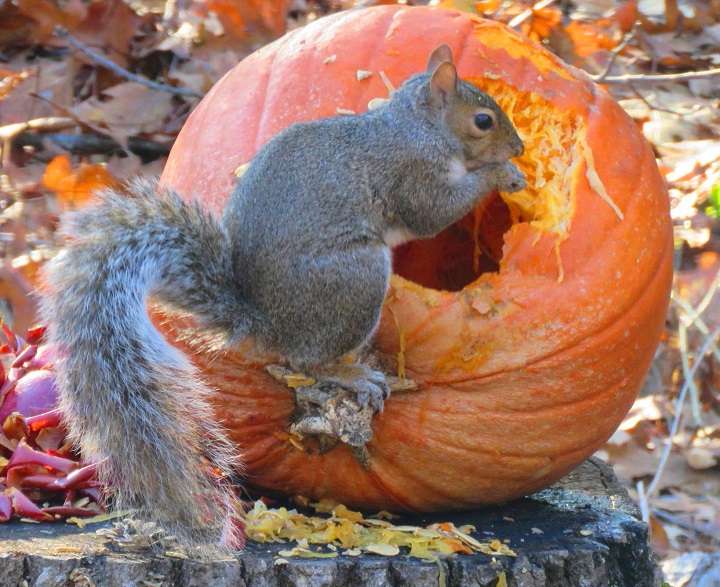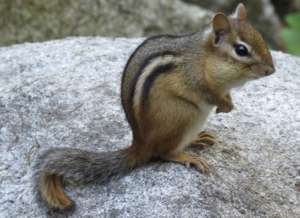CRITTER CHATTER – Hit or miss: a squirrel and chipmunk
 by Jayne Winters
by Jayne Winters
When I visited with Don today, there were two new admissions in small cages in his living room: a young chipmunk and a gray squirrel, both likely HBC (Hit By Car) victims. The chipmunk wasn’t in good shape; he was hunched up in a corner of his cage, his fur very disheveled. Don said he didn’t appear to have any broken bones, but initially had a bloody mouth and was in shock.
Even if an injury is minor, shock can quickly kill. When I researched on-line, I found it interesting to learn that an animal with a mild head injury may be more likely to survive than one with minor fractures because the ability to register fear and pain can be impaired from a head injury, whereas fractures cause more pain, fear and stress, which can lead to shock. Being careful not to handle the chipmunk much and further traumatize him, Don has syringe-fed him with squirrel or puppy milk to provide nourishment and hydration. Over a couple of days, the chipmunk has been able to eat and drink on his own, as well as ‘go potty’ and is moving around the cage, albeit stiffly. He’s being kept warm with a small heating pad.
The squirrel came in the same day as the chipmunk and physically looks to be in much better condition. He had a bloody nose upon arrival, but his larger size probably helped him tolerate the impact better. He, too, was sleeping soundly when I was at the house, but curled up in a normal position; he’s now been eating and drinking appropriately. I also learned that small animals can be given infant or child ibuprofen for pain; dosage is determined by the animal’s weight.
According to World Atlas, about 41 million squirrels are killed by drivers annually. Researchers theorize that squirrels (and I would assume other rodents and small mammals) view oncoming cars as predators. Squirrels tend to stop and start and change direction constantly in an effort to confuse and avoid predators such as hawks, owls, and foxes. They often freeze and then run out of the way at the last minute in an effort to escape claws and jaws. Unfortunately, that instinct doesn’t work well with cars.
In addition, because their eyes are positioned on the side of their heads, depth perception and any ability to sense how fast cars are moving are severely limited. Their visual perspective is much different than ours – their eyes are about 2 inches from the pavement! While they may comprehend something is coming, their brain and vision can’t process the concept of speed. By the time instinct kicks in, it’s simply being in the wrong place at the wrong time that determines whether it successfully gets across the road or not.
Autumn seems to be peak time for squirrel fatalities on the road. They’re busy collecting food for the winter and looking for places to store it, crossing roads more frequently. Young squirrels are out of the nest and on their own for the first time; inexperience and lack of evasive maneuvers from potential predators increase their chance for collisions.
Despite what some people may think, it’s highly unlikely that wildlife play tag or chicken with on-coming cars or trucks. Sadly, there are drivers who find sport in chasing down an animal, no matter its size or species, and intentionally swerve out of their way to hit it, but I hope they are few and far between.
A follow-up to the opossum I mentioned in last month’s article: another suspected HBC victim, it had suffered a broken jaw. Although it was fed milk and vitamins with a syringe for a couple of days, Don was concerned about its ability to survive in the wild. He took the opossum to the vet and they discovered in addition to the broken jaw, its nasal cavity was also severely fractured. These injuries were not anything that would heal well; the kindest thing to do was humanely euthanize it.
Other rehabbers continue to generously provide assistance to help keep critter care at Duck Pond manageable.
They are greatly appreciated! Please check the following web sites to see if there is a rehabber near you: https://www.mainevetmed.org/wildlife-rehabilitation or https://www.maine.gov/ifw/fish-wildlife/wildlife/living-with-wildlife/orphaned-injured-wildlife/index.html.
Donald Cote operates Duck Pond Wildlife Care Center on Rte. 3 in Vassalboro. It is a non-profit state permitted rehab facility which is supported by his own resources and outside donations. Mailing address: 1787 North Belfast Ave., Vassalboro ME 04989 TEL: (207) 445-4326. Please note the previous e-mail address is no longer monitored.
Responsible journalism is hard work!
It is also expensive!
If you enjoy reading The Town Line and the good news we bring you each week, would you consider a donation to help us continue the work we’re doing?
The Town Line is a 501(c)(3) nonprofit private foundation, and all donations are tax deductible under the Internal Revenue Service code.
To help, please visit our online donation page or mail a check payable to The Town Line, PO Box 89, South China, ME 04358. Your contribution is appreciated!




Leave a Reply
Want to join the discussion?Feel free to contribute!